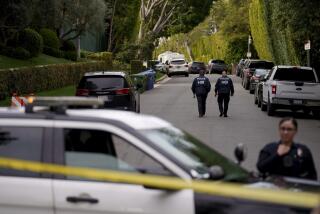Arrest Puts King’s Parole in Jeopardy
State prison officials said Thursday that the arrest of Rodney G. King for allegedly trying to run down a Los Angeles vice officer with his car after picking up a transvestite prostitute could result in the revocation of his parole, returning him to prison for a 1989 robbery.
The state Department of Corrections said it does not need another conviction, only a “preponderance of evidence” that laws have been broken. King was paroled in December, 1990, after serving one year for robbing a Monterey Park convenience store.
As parole officials debated King’s future, new details of his past emerged.
Court records reviewed by The Times on Thursday show that King, whose videotaped beating by Los Angeles police in March caused nationwide outrage, was convicted in 1989 of trying to hire a prostitute on a Pasadena street.
The files also show that in 1987 King was convicted of misdemeanor battery in an incident involving his then-wife and placed on probation.
His arrest Tuesday occurred after King picked up a transvestite prostitute at a street corner in Hollywood, according to police. King has admitted he picked up the prostitute, according to parole officials, who talked to him both Wednesday and Thursday at their offices in Pasadena.
The undercover officers, who said they had the prostitute under surveillance, followed King’s vehicle to a carport behind an apartment.
The vice officers say the prostitute spotted them and, as they identified themselves as police officers, King sped away, nearly running one of them down. On Thursday, the Los Angeles County District Attorney’s office had yet to receive evidence from police and decide whether to file charges against King.
The parole officials said King told them a different story, contending that he mistook the vice officers for would-be robbers and fled in fear. King and police agree that he flagged down a passing patrol car moments later.
Jerome DiMaggio, a regional administrator with the state Department of Corrections, said that as far as Tuesday’s arrest is concerned, “the thing that could imperil his parole is the allegation that he tried to run down one of the vice officers with his car.”
Department of Corrections Supervisor Alex Rubio said that in deciding whether to revoke parole, deputy commissioners will review all available information to determine if there is a preponderance of evidence that his conduct is in violation of the law.
“He doesn’t have to be convicted of anything,” Rubio said.
But Rubio said it also depends on the parolee’s “patterns of behavior” and any special conditions of his parole.
If, for example, a parolee has a history of alcohol abuse and use of alcohol is forbidden under the conditions of parole, a drunk-driving citation could cause the parole to be revoked.
Because King was not believed to have such a history and because his use of alcohol was not forbidden, police allegations that he was legally drunk at the time of the March 3 beating might not jeopardize his parole.
Court files reviewed Thursday showed that King has been accused of violating the terms of probation in past cases.
Pasadena Municipal Court files state that King pulled up to a curb at Fair Oaks Avenue and Peoria Street in Pasadena on Jan. 18, 1989, and was arrested after soliciting a sex act from an undercover Pasadena policewoman.
He pleaded guilty in February, 1989, to a misdemeanor charge, was fined $352.50 and placed on a year’s probation. The fine was not paid--technically violating his probation--and in July, 1989, an arrest warrant was issued. According to the records, that warrant is still outstanding.
He pleaded no contest to a misdemeanor battery charge in the 1987 domestic violence incident and was sentenced to two years’ probation, during which he was to participate in a domestic violence diversion program.
King’s ex-wife Dennetta King, the alleged target of his violence, did not pursue charges against him, and on Thursday she declined to comment.
The records indicate that the probation was briefly revoked when he failed to enroll in required counseling sessions, but it was reinstated.
Officials sought to have his probation revoked again last year after his arrest for the November, 1989, Monterey Park robbery, according to a probation report in the court files. King was sentenced to two years in state prison for the robbery.
In addition, King had been arrested in June, 1983--at the age of 18--for allegedly attempting to run down his future wife, Dennetta, with his car in Altadena after an argument. However, Dennetta refused to press assault charges and King was convicted of reckless driving. He was sentenced to--and completed--84 hours of community service.
Two months later, he was charged with petty theft for allegedly failing to pay for $251.87 worth of merchandise at a Pep Boys auto parts store in Pasadena, according to the records.
Records show that after King failed to appear in court as scheduled in August, 1983, for a hearing on the Pep Boys incident, a warrant for his arrest was issued. The warrant was recalled the following March when he appeared in court, was convicted of a reduced charge of trespassing, was ordered to repay the $251.87 and was placed on 60 days’ probation.
More to Read
Sign up for Essential California
The most important California stories and recommendations in your inbox every morning.
You may occasionally receive promotional content from the Los Angeles Times.










